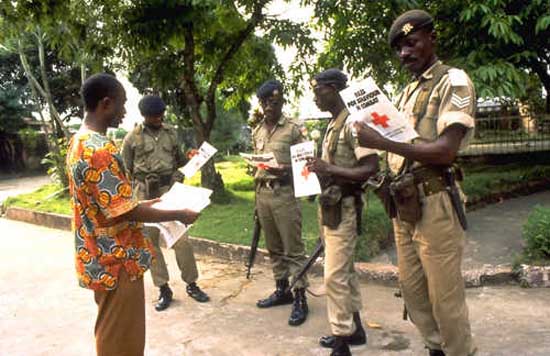
Stephen Grogoza was a Peace Corps volunteer in both Togo and Liberia in the late 1970s and early 1980s and has frequently traveled to the region since
Diverse cultural identities
It was not always this way in Togo, with the current waves of democratic culture tossing throughout the land. Prior to 1991, when Eyadema legalized political parties other than his own RPT, there was only the patriarchal model of authority relationships in the nation's culture. In that model, the local village chief was supreme and wielded absolute power. Eyadema conducted himself as the nation's "village chief" and was viewed that way, too, by the people. In such a framework, no elections were necessary (although the president periodically conducted them, making available, however, only the RPT's slate of candidates).
Still, an unwritten, unspoken contract was agreed to by both sides, who assumed mutual, binding obligations. The people's was to follow and support the national government, while the leader's was to provide peace, prosperity, and justice.
As the years passed, both sides delivered. The people supported Eyadema; the president, through his benevolently autocratic leadership and artful balancing of the nation's ethnic groups in his cabinet and throughout his governmental bureaucracy, maintained stability, tranquillity, and peace in Togo.
"One of the things about Eyadema is that he's been able to unite all the tribes," says Stephen Grogoza, a Naples, Florida, lawyer who was a Peace Corps volunteer in both Togo and Liberia in the late 1970s and early 1980s and who has frequently traveled to the region since. "You never see intertribal rivalry in Togo. But in Liberia, on the other hand, I would go to one area and they'd say, Where'd you come from?' And I would tell them. And they'd say, Oh, my God! Those people are butchers, murderers, rapists-you're lucky you got out of there alive!'" Then he would go back to the area they spoke of, and the people there would say the same thing about where he had just come from.
According to Grogoza, Liberia's leaders, including Presidents William Tubman, William Tolbert, and Samuel Doe (who seized power in a bloody coup in 1980), sought to enrich only themselves, their families, and their tribes, stoking resentment among the nation's other ethnic groups. This was not the case, however, in Togo. Eyadema, although reserving a superior portion of government and military jobs for his own Kabre ethnic group, provided generous slices of the pie to others as well. In fact, the president's cabinet contains five Ewe, including the foreign and defense ministers; two Mina; two Kabre, including the interior minister and ambassador to the United States; one Cotocoli; one Losso; one Lamba; and one Loba.
In America and Europe, such ethnic groups have usually been referred to as "tribes." Many experts see the designation is an unfortunate one, however, because it connotes human groupings that are primitive, barbaric, and changeless; it ignores the multiplicity of African civilizations, some of them simple and some complex and advanced.
"At best," argues Chris Lowe of Boston University in a paper distributed by the Africa Policy Information Center, "any interpretation of African events that relies on the idea of tribe contributes no understanding of specific issues in specific countries. At worst, it perpetuates the idea that African identities and conflicts are in some way more 'primitive' than those in other parts of the world. Such misunderstanding may lead to disastrously inappropriate policies."
Lowe and his coauthors suggest that other terms, depending on the context, should be used instead of tribe, such as people, ethnic group, nationality, community, village, chiefdom, or kingroup. "Whatever the term one uses," he says, "it is essential to understand that identities in Africa are as diverse, ambiguous, complex, modern, and changing as anywhere else in the world."
In Togo's north, the dominant ethnic groups are the Kabre and Cotocoli, which make up some 30 percent of the total population. Most of them live in the Sokode, Baffilo, and Kara region and are impoverished peasants. The Lamba, Losso, and Tchokossi people (all Muslims who migrated from Ivory Coast during the eighteenth century) also live in the north. The Ewe, Mina, and Ana, who reside in the country's southern and coastal areas, have traditionally been viewed as Togo's commercial, political, and intellectual cream. Because they enjoyed the benefits of first contact with the European traders, the colonialists then conferred on them commercial and educational advantages over northern Togo's people and enlisted southerners to help run the colonial administration.
